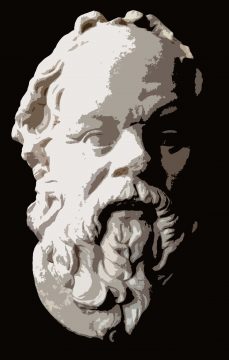by Scott F. Aikin and Robert B. Talisse

When people talk about Socrates, they typically refer to the leading character in Plato’s dialogues. This is because little is known about the historical Socrates beyond the fact that he wandered barefoot around Athens asking questions, an activity that got him executed for religious invention and corrupting the youth in 399 BCE. The relation between the historical figure and the Platonic character is debatable. In any case, Plato’s Socrates is most commonly read as a staunch anti-democrat. However, once one distinguishes between being opposed to democracy from theorizing the ways democratic society can fail, the relationship between Socrates and democracy grows more complicated.
The depiction of Socrates as an anti-democrat draws largely from the scathing critique he launches in Plato’s masterpiece, The Republic. There, Socrates famously characterizes democracy as the rule of the unwise, corrupt mob. Like children loose in a candy store, the democratic herd pursues pleasure only, rewarding sweet-talkers and flatterers with the power of political office, who in turn exploit politics for their own gratification. The result is injustice. Accordingly, Socrates says, democracy ultimately dissolves into tyranny — a population of citizens dominated by their basest desires, and an opportunistic ruler that manipulates them for personal gain.
Socrates’ critique of democracy is formidable. Notice, however, that Socrates is laying out a vulnerability inherent within democratic politics that no advocate of democracy can afford to ignore. In fact, the tradition of democratic theory is largely focused on identifying ways in which this vulnerability can be mitigated. And popular discussions today about disinformation, corruption, and incivility tend to concede much of Socrates’ case. The point is that giving voice to a standing weakness of democracy does not by itself make one an anti-democrat. One might argue that a crucial part of democratic advocacy is to engage in criticism of extant democratic practice.
Yet in The Republic, Socrates also lays out a vision of the perfect city, the kallipolis, and it is decidedly undemocratic. Kallipolis is an absolute kingship where philosophers rule over a strictly stratified society in which everything is exactingly regulated, from education, production, and conquest to art, diet, sex, and parenting. According to the standard line, that Socrates proposes the kallipolis as the paradigm of justice entails that he is an anti-democrat. Read more »
